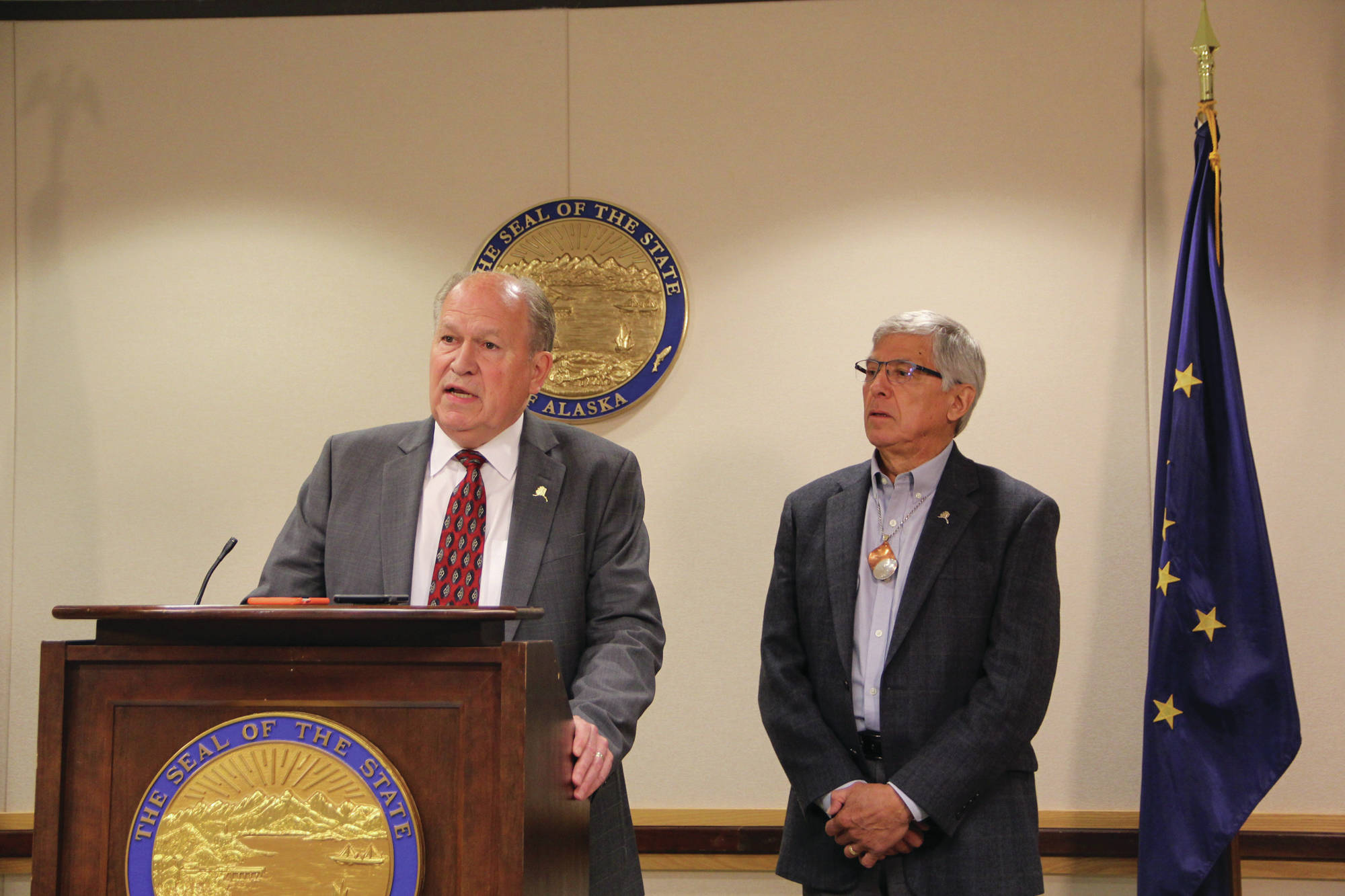It might be the peak of summer, but it feels a lot more like Groundhog Day in Alaska politics.
Gov. Bill Walker held a press briefing at noon Monday at which he again urged legislators to pass the bills needed to cure the state of its massive annual deficits. The budget deficit was about $2.5 billion for the 2017 fiscal year that ended June 30.
“I know I’ve been critical of the Legislature as a whole; it’s about getting the job done,” Walker said Monday at the state Atwood Building in Anchorage.
One day short of a year earlier, the Legislature convened for a special session called by Walker to make cuts to the state’s North Slope oil and gas tax credit program, approve spending investment earnings from the Permanent Fund on government services and other revenue measures in the governor’s fiscal plan.
“I am absolutely convinced that if we don’t fix this now, then our challenges next year will be even more magnified,” the governor said during a June 19, 2016, news conference shortly after the House Finance Committee shot down his Permanent Fund restructuring bill.
As he spoke Monday — somewhat through reporters to legislators — lawmakers were again hung up on North Slope oil and gas tax credit legislation in a summer special session.
This year, the debate is not as much over ending the credits as both the Democrat House Majority and the Republican Senate Majority agree the shelf life on the refundable tax credit experiment has expired. The sticking point now is whether to raise oil taxes as well.
Each caucus held a press conference in recent weeks to publicly pitch their version of House Bill 111, the tax credit legislation, once more. Republican Senate President Pete Kelly said at the time he would call the Senate back to order Monday, July 10 to work on finalizing the bill if House Majority leaders would schedule conference committee meetings.
House Democrat leaders said they would call meetings if progress was made in private negotiations, which is how they said Senate leadership wanted to proceed.
As of Monday afternoon there were no meetings scheduled for the remainder of the special session, which ends July 16.
Walker did not specify if or when he would call legislators back for a third time this year if a comprehensive deal isn’t reached in the next few days but said he talked with legislative leaders over the weekend and was encouraged by what he heard.
“We’re going to let this week play out,” Walker said.
It is worth noting that legislators could call and set the agenda on their own special session with a two-thirds vote of the combined House and Senate.
Both bodies have also passed differing versions of Walker’s Permanent Fund bill, which could provide up to about $1.8 billion per year in new General Fund revenue, but contingencies tied to its passage have stalled progress there. Simply put, the Democrats want an income tax and the Republicans don’t.
Walker has supported a small state income or sales tax, but said Monday the state generally needs new revenue sources, through taxes, the Permanent Fund or something altogether different.
“We do need new revenues,” he said, repeating a sentiment he has stressed virtually daily for almost two years. “I know people push back a bit on that but we need a way of funding government. When you lose 80 percent of your revenue you can’t live on savings forever.”
On June 20, S&P Global Ratings made it known once again that credit raters are still anxious about the State of Alaska’s finances when the agency put the state back on “CreditWatch negative”, indicating if lawmakers don’t make major changes soon the ratings agency will have to downgrade the state’s credit rating.
All three major credit houses downgraded Alaska early in 2016 for its budget problems. S&P also had the state on a negative CreditWatch last summer but pulled the warning after Walker made significant vetoes to the operating budget, which included unprecedented move of halving the Permanent Fund dividend.
However, the state’s savings are one marked difference between this year and last.
Last year, the state had one more year’s worth of savings to fill the deficit, inevitably challenging the push by Walker and some legislators to overhaul the state’s finances then.
Now, administration officials estimate the state will have about $2 billion left in the Constitutional Budget Reserve at the start of fiscal 2019. That means covering the deficit with savings next year is a long shot and would basically wipe out the CBR — the last available savings account — if it can be done at all.
Walker noted the state has used about $14 billion in savings just since 2013 as a way to again emphasize the need for fiscal reforms.
With the big pieces of such reform all in conference committee the governor once more asked legislators to finish the job.
“Since you’ve done the hard work to take the tough votes and potentially unpopular votes — there’s no popular votes that are out there when you’re fixing a fiscal plan,” Walker said. “They’ve done that; you might as well get the product from it.”


